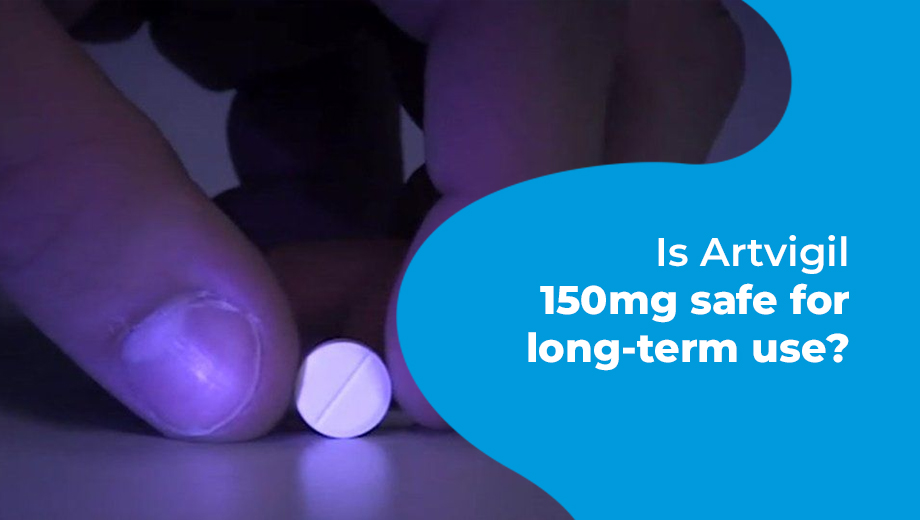Artvigil 150mg is a prescription medicine that is based on armodafinil. The US FDA approved armodafinil in 1998. This drug stimulates the central nervous system (CNS). As a result, the person consuming it becomes awake and active. It is used to treat excessive sleepiness due to sleeping disorders.
The Benefits of Artvigil-150mg for Long-Term Use
Hassle-free usage
Artvigil 150mg is available in the form of oral tablets. Its active ingredient, armodafinil, is not soluble in water. Hence, you cannot inject it into your bloodstream. This makes it easier to follow your dosage regimen. You can consume it with or without food. You can easily pop a tablet and swallow it with water. The only consideration is to keep the tablet intact while you have it.
Efficient wakefulness
Armodafinil remains in the blood for a longer time as compared to modafinil. Thus, armodafinil can have the same wakefulness effect at lower concentrations. Artvigil 150mg can help you stay awake for 12–15 hours.
Low potential for addiction
Armodafinil comes under Schedule IV of the Controlled Substances Act (CSA). It has a comparatively low potential for abuse but requires a medical prescription for consumption. Thus, Artvigil 150mg has low chances of getting you addicted while using it to treat your sleep disorders. However, this drug is a CNS stimulant. Therefore, albeit low, it does have some psycho-elevative effects like other stimulants.
Potential Side Effects to be Aware of
Although Artvigil 150mg can give you satisfactory results, remember that it is a medicine. And medicines are prone to side effects. These are the side effects that can occur after consuming this medicine:
- Skin-related side effects such as rashes, blisters, discoloration, etc.
- Allergic reactions include hives, swelling of the face, throat, and eyes, and difficulty breathing.
- Organ-related complications like nephritis, myocarditis, hepatitis, etc.
- Fever
- Anxiety
- Depression
- Episodes of mania
- Suicidal ideation
The side effects listed above, although rare, are severe. If you experience any of these reactions, immediately contact your doctor or emergency services.
Some of the minor, common side effects are:
- Back pain
- Stuffy nose
- Indigestion
- Headache
- Insomnia
Expert Insights on Safety and Efficacy
Abuse potential of Artvigil 150mg
Earlier, amphetamines were used to treat several sleeping disorders. However, these drugs have a higher potential for addiction. They give you a rush of joy, euphoria, and energy. This can lead to drug abuse. Armodafinil, on the other hand, has a completely different pharmacological profile. It does not have as strong an effect as amphetamines. Hence, Artvigil 150mg is less likely to be abused.
Reduced cardiovascular events
CNS stimulants are associated with a number of cardiac problems. They cause the heart to beat faster and increase the blood pressure. It has been found that armodafinil drugs have a lower risk of such issues. However, it is best to continuously monitor your cardiovascular parameters to be safe.
Armodafinil in blood
Armodafinil is an R-enantiomer. While modafinil contains an S-enantiomer along with armodafinil, which has a short half-life. Thus, armodafinil can stay for a longer time in the blood compared to modafinil. Studies have shown that armodafinil has a stable presence in the blood with fewer fluctuations.
Tips for Long-Term Use and Dosage Recommendations
Recommended dosage for Artvigil 150mg:
- 150mg of armodafinil or 1 tablet for narcolepsy and obstructive sleep apnea
- 150 mg of armodafinil or 1 tablet one hour before the shift begins for sleep work shift disorder.
Artvigil 150mg is an excellent alternative to amphetamines for the treatment of sleeping disorders. However, you must remember that it affects your brain. Hence, you must follow the given tips:
- Do not consume Artvigil 150mg unless a licensed practitioner instructs you to do so.
- Give them all your medical and dietary information.
- Do not hesitate to inform the doctor if you have a history of alcoholism or drug abuse.
- Stick to the dosage and guidelines given by your doctor.
- Do not stop taking the medication suddenly.
- Inform the doctor or call emergency services if you have any abnormal reactions.




